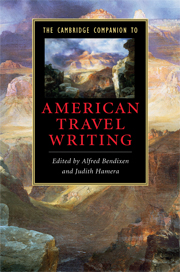Book contents
- Frontmatter
- Introduction: new worlds and old lands - the travel book and the construction of American identity
- Part I Confronting the American landscape
- Part II Americans abroad
- 6 American travel books about Europe before the Civil War
- 7 Americans in Europe from Henry James to the present
- 8 Americans in the Holy Land, Israel, and Palestine
- 9 Americans in the larger world: beyond the Pacific coast
- 10 South of the border: American travel writing in Latin America
- Part III Social scenes and American sites
- Chronology
- Further Reading
- Index
8 - Americans in the Holy Land, Israel, and Palestine
from Part II - Americans abroad
Published online by Cambridge University Press: 28 March 2009
- Frontmatter
- Introduction: new worlds and old lands - the travel book and the construction of American identity
- Part I Confronting the American landscape
- Part II Americans abroad
- 6 American travel books about Europe before the Civil War
- 7 Americans in Europe from Henry James to the present
- 8 Americans in the Holy Land, Israel, and Palestine
- 9 Americans in the larger world: beyond the Pacific coast
- 10 South of the border: American travel writing in Latin America
- Part III Social scenes and American sites
- Chronology
- Further Reading
- Index
Summary
In the nineteenth century, travel books about the Holy Land, then ruled by the Ottoman Empire, were enormously popular. Travelers were thrilled to enter the holy city of Jerusalem, as well as to experience the exotic East. After World War I, travelers also came to investigate the Zionist experiment, or they at least had to address the Jewish presence in their field of vision in British Mandate Palestine. After the state of Israel was founded in 1948, a great many travel accounts appeared celebrating the kibbutzim and other social innovations of the new state. The Israeli-Palestinian conflict deepened after Israel occupied the West Bank and Gaza in 1967 and Israel became a central player in United States foreign policy. While the religious aspect of Holy Land travel remained and, if anything, grew even more complex, travel accounts became increasingly political, including histories, interviews with leaders, and visits to Palestinian refugee camps, Jewish settlements, and other scenes of conflict. In this essay, I examine literary books by Americans who travel to all of these places - Holy Land, exotic East, Land of Israel, conflict zone - focusing on common characteristics. There are dramatic differences between nineteenth and twentieth-century travel accounts, because of the stark change in political circumstances from one century to the next. But they share certain modes of response to the complex religious and psychological encounter with the idea of a sacred landscape. Travel to other parts - Italy or Greece, for example - provided important meanings about culture to Americans in the nineteenth century; but travel to the Holy Land posed ultimate questions.
- Type
- Chapter
- Information
- The Cambridge Companion to American Travel Writing , pp. 145 - 164Publisher: Cambridge University PressPrint publication year: 2009
- 3
- Cited by



